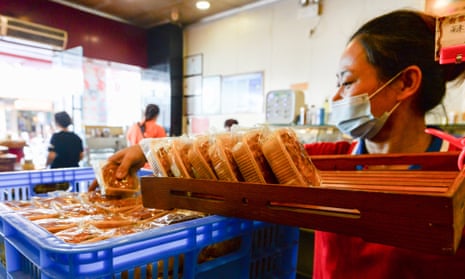Chinese authorities have launched a crackdown on “sky high” mooncake prices ahead of this weekend’s autumn festival, amid government efforts to curb corruption and societal excesses.
Mooncakes, a small customary dessert baked with varying designs and fillings, are traditionally given to family and friends to celebrate one of the most important holidays in the lunar calendar. Known as mid-Autumn festival in China and Taiwan, it is called Tsukimi in Japan, Chuseok in South Korea, and Tet Trung Thu in Vietnam.
International online shopping guides have collated the best places to find the most luxurious boxes of mooncakes to impress friends and relatives for the celebration of the fall harvest. Some cost upwards of £20 each cake, or come with luxury branding. But in Xi Jinping’s China, such opulent gifts are not just frowned upon but heavily regulated.
In the lead up to the festival, anti-corruption and commerce authorities have targeted sellers who are overcharging or offering “excessive packaging” which exceeded strict limits on production costs and banned ingredients. As part of the campaign, sellers are also required to keep mooncake sales records for two years. Law enforcement officers have inspected 180,000 sellers and suppliers since early August, the state administration for market regulation said.
Authorities said the average box of mooncakes cost about 70RMB (£8) to produce, and should not exceed a retail price of 500RMB, local media said. About 80% of products were sold for less than half that, but some sellers were pricing their cakes at 499RMB, or combining them with increasingly extravagant gift packages, local media reported. Some have bundled them with other products like nuts or liquor, mislabelled them as “pastry gift sets”, or sold them as part of high-end packages at hotels.
“The cake is still the same cake, but the box is expanding year by year,” said one local media report.
The highly competitive mooncake giftbox market is reportedly worth about RMB16.9bn RMB in China, and producers have become increasingly inventive to stand out from the rest.
Clarissa Wei, a Taipei-based journalist and author of an upcoming Taiwanese cookbook, said the giving of mooncakes en masse began in the mid 20th century in Hong Kong, and spread to mainland China. They were now a “status symbol”, she said, with an element of competitiveness.
“Over the years, the packaging has become more and more elaborate and is, in many ways, just as important – if not more – than the pastries themselves,” said Wei.
“There’s also a lot of hype around the packaging; many brands will spend up to a year designing their mid-autumn mooncake boxes.”
China’s mooncake crackdown – which also occurred at least twice before in 2013 and 2014 – is a sign of the CCP’s push to curb societal excesses. Other campaigns or laws have discouraged expensive wedding celebrations and “vulgar” practices that reflect “rampant money worship”, limited the number of dishes a table can buy at a restaurant, and introduced fines for the promotion of performative overeating.
“These [high priced mooncakes] not only deviate from the origin of traditional culture, but also contribute to extravagance and waste, and have a negative impact on the social atmosphere, and may even be alienated into a carrier of corruption,” one official told China News Weekly.
In China some sellers have suggested the apparent return of expensive mooncake sales in defiance of the ban is linked to China’s economic woes. Small and medium sized businesses have suffered in a financial downturn largely driven by Covid restrictions. On Nanjing retailer, selling both standard mooncakes and fancy packaged ones, told the Guardian business was much worse than in previous years.
Authorities urged Chinese people to pay attention to “festival corruption” and send tip offs for follow up.
Additional reporting by Xiaoqian Zhu and Chi Hui Lin
